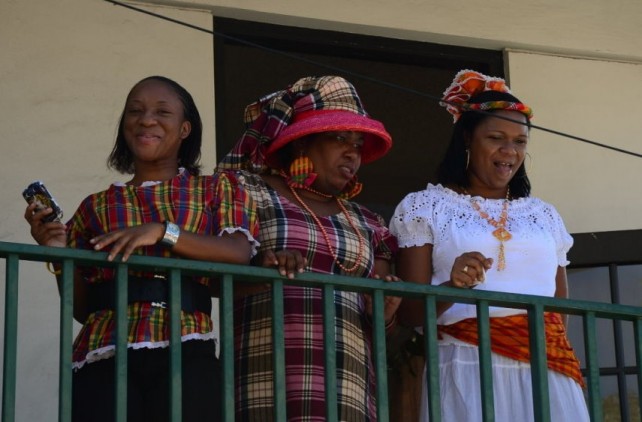
The following article article was first published on October 31st, 2014.
Efforts to develop and promote the Kwéyòl (Creole) language and culture and in effect, a Dominican national identity, date back to the 1950s and 1960s with the late Premier Edward Oliver LeBlanc and the late Cissie Caudeiron.
Leblanc’s government succeeded in gaining internal self-rule from Britain, developed the early symbols of nationhood and started a revival of folk traditions through national day festivals and literature. Cissie Caudeiron, a creole activist, promoted traditional creole wear, traditional dances and the use of Kwéyòl in plays and in songs.
That period saw the first recordings of folk songs and the emergence of chorales. The 1970s ushered in a new genre of creole music called cadence-lypso and with it, a plethora of electronic bands, with creole language at the centre.
The Creation of KEK
The 1980s ushered in a new phase in the struggle to define and develop a national identity. Dominica was now an independent nation, having formally gained such status on November 3, 1978. In June 1980, stimulated by the work of the budding creole movement in St.Lucia, Guadeloupe and Martinique, the Division of Culture of the Government of Dominica invited a group of young creole activists, functionaries and teachers to form the Standing Committee for Creole Studies/Konmite pou Etid Kweyol (KEK).
Since then, KEK in partnership with the Cultural Division has promoted research on the French creole language, dispensed with the name patois in favour of Kwéyòl, adopted a standard Kwéyòl orthography, implemented Kwéyòl literacy programmes and produced a body of Kwéyòl literature including a Kwéyòl Dictionary, kwéyòl newspapers, books on riddles, proverbs and popular expressions. Other actions included the establishment of Jounen Kwéyòl (Creole Day), Simenn Kwéyòl (Creole Week), Jounen Eritaj (Heritage Day), the development of creole pageants (Miss Wob Dwiyet, Madam Wob Dwiyet), the promotion of creole fashion, national creole wear, public art and decor, creole cuisine, herbal products, craft, jing ping music and creole music festivals, notably the World Creole Music Festival.
More recently KEK participated in the organization of a regional symposium to mark the 30th anniversary of International Creole Day. That symposium held on October 22-24, 2013 in Dominica brought together one hundred persons representing government institutions, mayors, academics, students, cultural activists and professionals from Haiti, Martinique, Guadeloupe, Dominica and St. Lucia.
KEK is currently developing a Kweyol language curriculum for schools and a new Kweyol Dictionary.
Brand Kweyol
Against this backdrop, creole and all its trappings have now become the hallmark of Dominica’s national identity. Creole has achieved brand status in Dominica. The creole brand has been appropriated and milked to the maximum; Jounen Kwéyòl, Simenn Kwéyòl, World Creole Music Festival, Creole in the Park, Creole Bòd Lanmè and the list goes on. Such creole-based celebrations and actions have become both institutionalized and popular. These have become the established and entrenched norm especially during the so-called ‘creole season’, the period September-October. All these actions reflect a new national and cultural consciousness and identity.
Regional cooperation
The emergence and growth of the creole movement entailed networking strategies at the regional level be it in the Caribbean or in the Indian Ocean region. A key element of this was the development of bilateral and multilateral cooperation with universities and other tertiary or specialized institutions.
Creole activists and academics at the Université Antilles-Guyane established a forum called in the 1980s. GEREC provided a forum and framework for reflection on philosophical and theoretical issues as well as the development of practical actions such as the development of a standard Kweyol orthography used in the Eastern Caribbean, the development of creole studies and language courses, curricula and teacher certification.
In this context, Creolité as a philosophical concept emerged. Creolité was developed by Martiniquan writers and academics such as Patrick Chamoiseau and Rafael Confiant among others in an effort to define creole identity and philosophy and provide an ideological and philosophical basis for the creole movement. Creolité is now recognized and accepted as an important concept in creole language, identity and cultural studies alongside concepts such as Negritude and is the focus of much academic debate and contestation.
More recently, the UWI Department of Linguistics, which has been engaged in research and documentation on Anglophone Caribbean creole languages for many years, is now broadening its remit and is linking into other Caribbean creole language development efforts. This Department recently spearheaded the development of a Charter on Language Policy and Language Rights of the Creole-Speaking Caribbean.
The Creole Symposium held in Dominica in 2013 promises to usher in a new period of regional and international cooperation among countries of the creole community of nations.

Yes, Hussey, I concur. Their names were not mentioned nor was Djamala’s. (Marcel Fontaine’s).
Also, I believe there is a word missing in the 4th paragraph towards the end. ( Creole activists…)
Lets us not forget one of the stalwarts of the creole revival movement even though he has since departed this world…Mr. Marcel Fontaine. A Dcan and Grandbayrian to the bone!
We must again thank Felix Henderson & Dennis Joseph for advance this creole in Dominica.